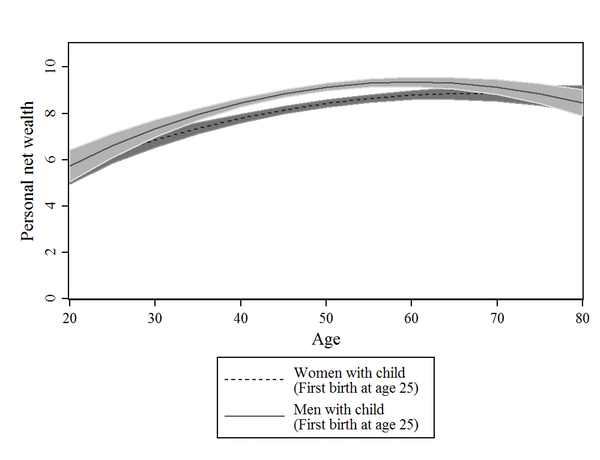Mothers Are Less Wealthy Than Women Without Children [Study]

In a recent research study, we measured the gender-specific economic impact of parenthood in Germany. Our finding: mothers may end up with less accrued wealth than women without children.
German men, who are comparable in other characteristics such as education and age, on the other hand, show similar amounts of personal wealth regardless of whether they have children.
Mothers accrue less wealth
The research, which was conducted in Germany, looked at 28,650 individuals to assess women’s personal wealth over the course of a decade, from 2002 to 2012. For the purposes of our study, personal wealth refers to all economic assets that subjects own solely as well as their individual share of assets jointly owned with somebody else.
We found that each year after a woman’s first child is born, she accrues only about 98 cents for each €1 of wealth that childless women gain. This small difference adds up over time. After being a mother for 50 years, a mother’s personal wealth is roughly 60% lower than for a German woman who does not have children, everything else remaining equal.

Graph showing gender gap in wealth after parenthood. Lersch/Jacob/Hank
This gap in capital is largely related to employment. German mothers accumulate less wealth because they are likely to stop paid work to care for their young children and, as children get older, return to work part-time.
Without full-time employment, women have less income to put into savings. Employment gaps may also reduce long-term earning potential because career advancement becomes less likely.
According to our study, women’s male partners do not appear to fully compensate for these losses in wealth by sharing financial resources within the couple.

Germany lacks structures to help mothers with childcare. Thomas Peter/Germany.
The loss in personal wealth is greater the younger a woman is when she becomes a mother. The difference may be due to the fact that career interruptions early in one’s working life are especially harmful.
Mothers additionally accrue less wealth if they are unmarried when they give birth; a difference that holds for both single mothers and those living with their partners. This finding suggests that married fathers may be more willing to compensate for their spouses’ income losses, and that married mothers and fathers are more likely to share their incomes.
By middle life (ages 40 to 60), mothers and fathers show the greatest discrepancy in wealth (see above graph). By older age, these inequalities decrease.
Why wealth differences matter
The reduced wealth of mothers as compared to fathers and to women without children has many important implications.
Financial assets and savings are resources that can be tapped to weather rainy days, independent of current income. Wealth can also be passed on to the next generation or invested in education and, thereby, affect the well-being of children.
For a woman living with a more wealthy partner, having little wealth may seem less important. But, as we know, couples do not always fully share their wealth.
And, in any case, inequalities in personal wealth within the same household also hurt women. German women reported lower subjective well-being if they had less wealth than their partners, and studies from Ecuador and Ghana have shown that the risk of intimate partner violence increases when women’s personal capital is less than that of their partners. Although we do not know whether those findings would apply in Germany or other countries.
Finally, economic inequality between mothers and fathers can affect children. When mothers have relatively more resources, the well-being of children is improved. If couples separate, gender inequalities within couples may ultimately contribute to inequalities between ex-partners.
International differences
Our research examined the wealth consequences of parenthood in Germany, where women have achieved equal status compared to men in many respects. Nonetheless, a traditional division of labour, where men are the main breadwinners, still dominates here.
Other research, though based on less adequate data, has also found a wealth gap between genders in the United States. Complementary evidence on income inequalities between mothers and fathers have additionally been found in many countries around the world, including China, Japan, Nigeria and the United Kingdom.

A mother’s wealth decreases further in countries that have greater gender inequality. Schmid-Reportagen/Pixabay.
Gender-based wealth inequality as a result of parenthood may be weaker in more egalitarian societies, such as Sweden.
Wealth inequalities between mothers and fathers – and, more generally, between women and men, even within married couples – are stronger in countries in which women and men do not have equal legal status.
In Ghana, for example, where women’s contributions to marital assets are not recognised, married women own only about 20% of household assets. Similar inequality exists in some parts of India.
By contrast, in Ecuador, where women’s legal status is more equal to men’s, wealth inequalities within married couples are negligible.
Economic well-being of women and men
The finding that, in relatively gender-equal Germany, women end up with less personal wealth after becoming mothers as compared to both childless women and to men suggests the need for a proactive government response.
Currently, ambiguous policies continue to hinder female employment. One approach for tackling mothers’ economic disadvantages is to encourage maternal full-time employment, for instance, by providing better access to childcare.
Recent policy reforms in Germany toward this goal may decrease disadvantages in the future. But wealth accumulation is a slow process, and these changes will take time to have any effect.
In the meantime, mothers will continue to struggle to save up for that rainy day.
Republished under a Creative Commons license. Read the original article.



















![[node:title]](/sites/default/files/styles/video_thumbnail_bottom/public/guy_with_unshaven_skin_face_young_skin_care_routine_beard.jpg?itok=qE9bZ04g)

